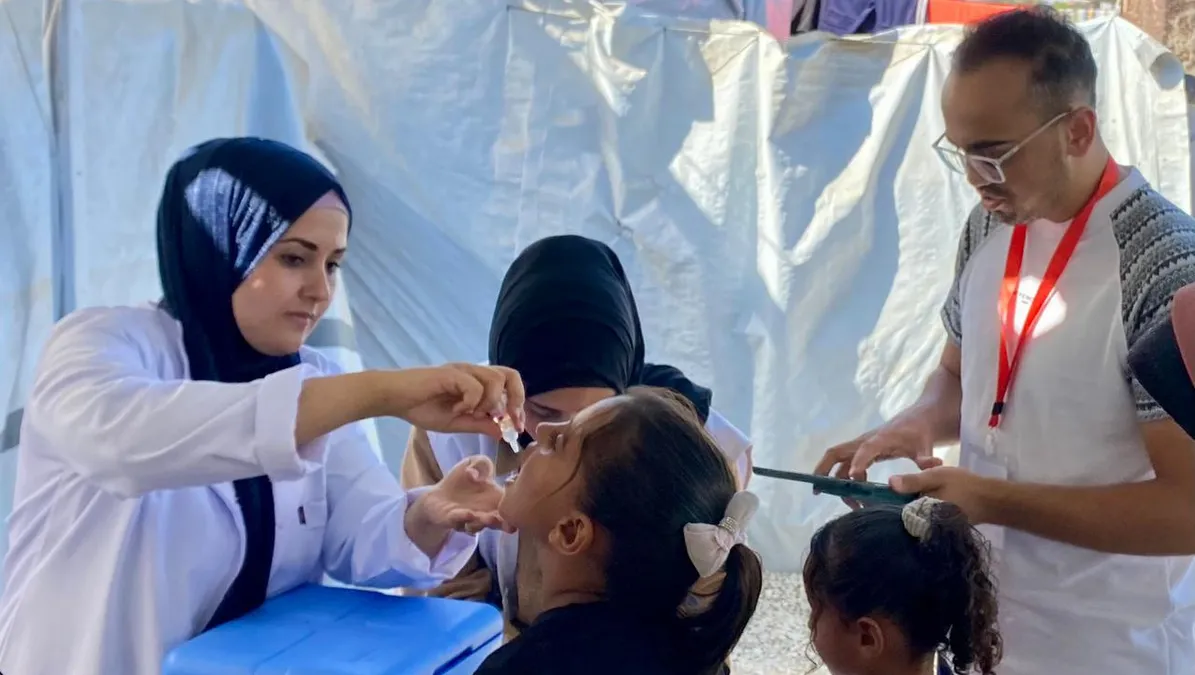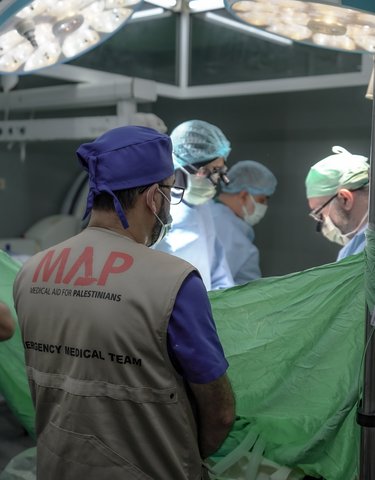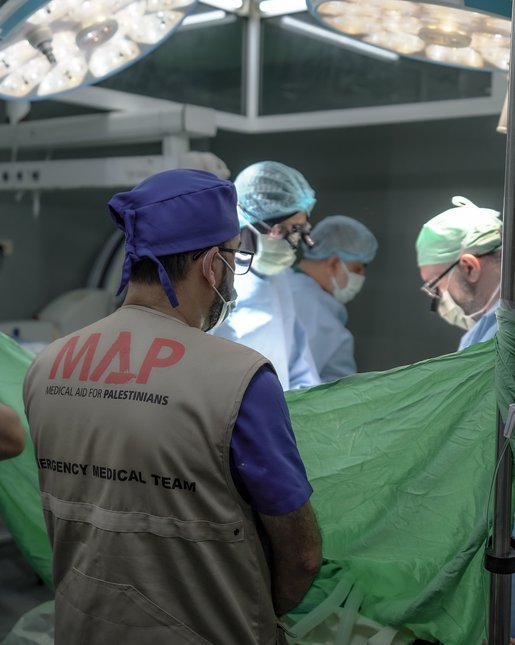How is MAP supporting Gaza’s polio vaccination campaign?
12 September 2024

In August, the first case of polio was confirmed in Gaza for more than 25 years, affecting a 10-month-old unvaccinated baby whose left leg was paralysed. In response, a mass vaccination campaign was launched by the World Health Organisation (WHO) and international partners in September to provide vaccinations to protect more than 640,000 children from infection.
Medical Aid for Palestinians (MAP) has been supporting this response by deploying 25 monitors to oversee the vaccination campaign, as requested by the WHO. Our teams are ensuring that international vaccination protocols and standards are followed and supervising data collection.
We spoke to Maram Al Shurafa, a Health Statistician with MAP, who has been working on our support for the polio vaccination campaign in southern Gaza.
What is polio?
Poliovirus (polio) is a highly infectious and life-threatening condition. It can cause paralysis, respiratory failure, cardiovascular collapse, and even death. It mainly affects children under five-years-old. There is no cure for polio; it can only be prevented by immunization. It was eradicated in Gaza 25 years ago, but Israel’s ongoing military offensive has severely impacted vaccine coverage. Routine immunisation coverage for second doses of the polio vaccine dropped from 99% in 2022 to less than 90% in 2024.
How have you been working on the vaccination campaign?
The polio vaccinations are administered at hospitals, clinics, mobile health units, primary health care centres, and medical points run by aid organisations and local partners. This includes five of MAP’s medical points in southern and central Gaza. The locations are spread out across Gaza to reach as many children as possible. They are often situated in highly populated areas and near camps where internally displaced people are sheltering, to ensure easy access for families.
Each vaccination point is staffed by trained medical personnel, including nurses and community health workers. They are well-versed in vaccine administration and cold chain management, and have also been trained by the WHO. The vaccines are stored in refrigerators and portable coolers or ice bags which were provided by UNICEF. These are regularly monitored to ensure they remain at the required temperatures.
Our teams are ensuring that vaccination protocols are followed, and are supervising data collection. We are also supporting the payment of local vaccinators and campaign workers, ensuring the rollout reaches every child.
We have faced some challenges such as a huge shortage of gloves, sanitisers, and clean drinking water for the team working.
How many children have been reached so far?
As of 9 September, more than 446,000 children had been vaccinated. This is a testament to the healthcare workers involved in the campaign, and the desire of people to get their children protected against polio.
Is delivering the vaccination campaign safe?
Accessing children for polio vaccination in Gaza has involved navigating complex logistical and safety challenges, both for the families and the healthcare workers. Children are almost always accompanied by an adult, usually a parent or guardian, when visiting vaccination centres. In some cases, older siblings or extended family members may also accompany younger children, especially when with children who have lost their parents or who are the only survivors of their families.
The mobile team units also travel to communities to ensure children who cannot easily reach vaccination centres still receive their doses, especially children who have been displaced from their homes and are sheltering in tents. These units set up temporary vaccination spots in ‘safe’ locations such as schools, mosques, or community centers, and in fixed vaccination points like hospitals and clinics. These locations are often chosen because they are close to populated areas, refugee camps, and communities in need, and so they should be relatively accessible.
However, many people don't have the money or the transportation to travel to these points. Families also often have to navigate areas with damaged infrastructure, roadblocks, or ongoing security threats, which makes the journey very risky. The fear of potential danger can deter families from seeking vaccinations.
Sometimes, even planned and well-coordinated efforts can be disrupted, requiring flexibility and rapid adjustments by healthcare teams to continue their vaccination efforts without compromising safety. We have also found that some of the coordination for accessing areas for vaccination safely has been rejected by Israeli forces.
Do you see any other health conditions that children need treatment for when they come to the vaccination points?
When children come for polio vaccinations in Gaza, it is common for healthcare workers to encounter other health issues that require immediate attention. The challenging living conditions in Gaza, ongoing Israeli military attacks, and restricted access to healthcare contribute to a high prevalence of various illnesses and injuries among children. This includes skin infections and conditions, such as impetigo and scabies. We are also seeing respiratory infections, gastrointestinal diseases, and chronic conditions like anemia and iron deficiency.
How are healthcare workers and the children receiving vaccinations coping from a mental health standpoint?
The mental health situation in Gaza, both among children and medical staff, is deeply affected by Israel’s ongoing military offensive, economic hardship, and the daily struggle for survival.
Medical staff are mainly struggling with high levels of burnout and stress with limited access to mental health support. Medical staff work under extreme conditions, often with limited resources, long hours, and the emotional toll of treating war-related injuries, malnutrition, and preventable diseases. The feeling of being unable to provide sufficient care due to supply shortages is a persistent source of stress.
What gives you hope for this campaign?
Despite the many challenges, what gives me hope is how many people and families want their children to be vaccinated. Also, the commitment and dedication of healthcare workers who are delivering the campaign, including the MAP team who are overseeing it, is inspiring.
Support healthcare workers and MAP’s emergency response in Gaza here.

